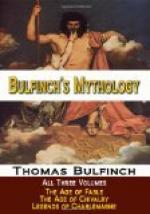They were well-nigh exhausted with fatigue when they arrived at its precincts, and in the darkness, not knowing what course to take, were glad to meet an aged woman, who, in reply to their inquiries, offered them such accommodations as her cottage could supply. They thankfully accepted the offer, and entered the low door. The good dame busily prepared the best fare her stores supplied,—milk, figs, and peaches,—deeply regretting that the bleak winds had nipped her almond-trees.
Sir Huon thought he had never in his life tasted any fare so good. The old lady talked while her guests ate. She doubted not, she said, they had come to be present at the great feast in honor of the marriage of the Sultan’s daughter, which was to take place on the morrow. They asked who the bridegroom was to be, and the old lady answered, “The Prince of Hyrcania,” but added, “Our princess hates him, and would rather wed a dragon than him.” “How know you that?” asked Huon; and the dame informed him that she had it from the princess herself, who was her foster-child. Huon inquired the reason of the princess’s aversion; and the woman pleased to find her chat excite so much interest, replied that it was all in consequence of a dream. “A dream!” exclaimed Huon. “Yes! a dream. She dreamed that she was a hind, and that the Prince, as a hunter, was pursuing her, and had almost overtaken her, when a beautiful dwarf appeared in view, drawn in a golden car, having by his side a young man of yellow hair and fair complexion, like one from a foreign land. She dreamed that the car stopped where she stood, and that, having resumed her own form, she was about to ascend it, when suddenly it faded from her view, and with it the dwarf and the fair-haired youth. But from her heart that vision did not fade, and from that time her affianced bridegroom, the Hyrcanian prince, had become odious to her sight. Yet the Sultan, her father, by no means regarding such a cause as sufficient to prevent the marriage, had named the morrow as the time when it should be solemnized, in presence of his court and many princes of the neighboring countries, whom the fame of the princess’s beauty and the bridegroom’s splendor had brought to the scene.”
We may suppose this conversation woke a tumult of thoughts in the breast of Huon. Was it not clear that Providence led him on, and cleared the way for his happy success? Sleep did not early visit the eyes of Huon that night; but, with the sanguine temper of youth, he indulged his fancy in imagining the sequel of his strange experience.
The next day, which he could not but regard as the decisive day of his fate, he prepared to deliver the message of Charlemagne. Clad in his armor, fortified with his ivory horn and his ring, he reached the palace of Gaudisso when the guests were assembled at the banquet. As he approached the gate a voice called on all true believers to enter; and Huon, the brave and faithful Huon, in his impatience passed in under




